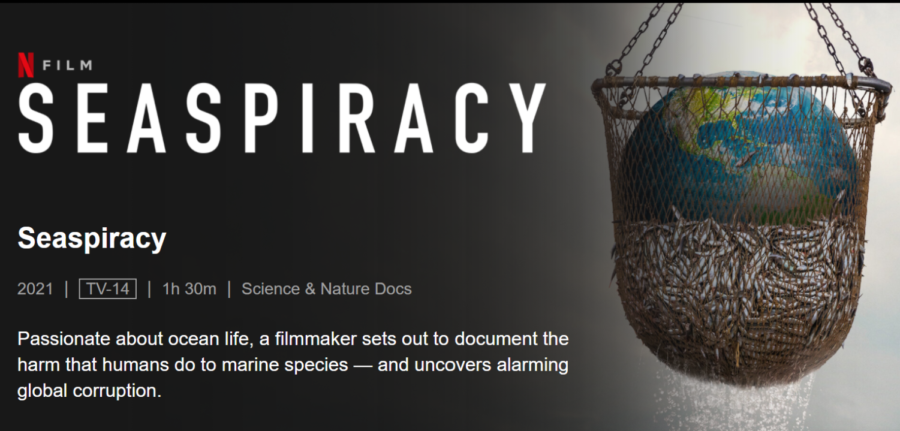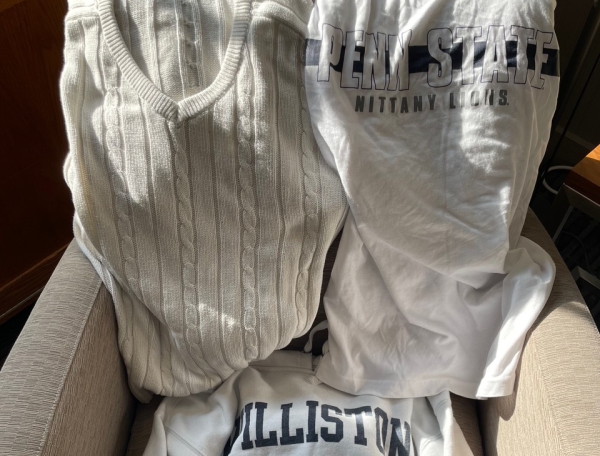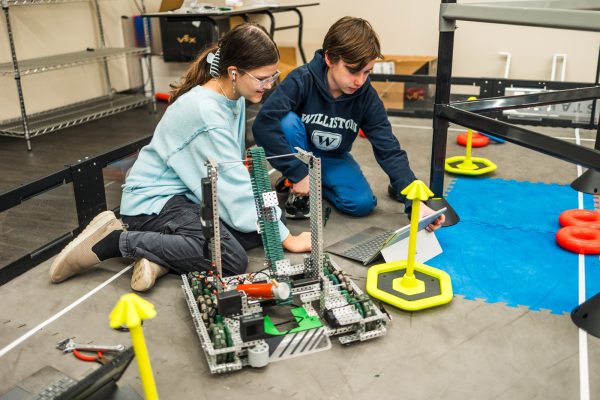“Seaspiracy” Shines Light on Dark, Dangerous Commercial Fishing Industry
A new Netflix documentary is opening the eyes of viewers about the damaging effects of the commercial fishing industry.
Although its title, “Seaspiracy,” is clever, the problem illustrated throughout the entire film is not as lighthearted: commercial fishing is a greater threat to marine life than we may realize, and with the ocean home to almost 80% of all life on Earth, this issue is urgent.
The movie, by Disrupt Studios and directed by Ali Tabrizi and Lucy Tabrizi, begins as a curious dive about plastics and pollutions and their impact on the world’s oceans. This changes, however, as Tabrizi discovers the hidden world of commercial fishing.
The 90-minute documentary, released on March 24, 2021, touches upon several different topics including slavery, the entertainment industry’s treatment of aquatic show animals, company corruption, and pollution problems. As demonstrated early in the movie, slavery helps fuel the seafood industry; ships posing as immigration vessels are in reality, according to the film, holding passengers captive and using them for labor.
However, the main emphasis of Tabrizi’s narration is to show how most of the products we see on the shelves of grocery stores claim to be sustainable, but these claims are fueled mostly by money. “Seaspriacy” claims money is the main motivation of some sustainable companies agendas, a conflicting claim, seeing as these sustainable companies also feed the media, thus creating a dangerous cycle throughout the media and public concerning products used by consumers.
Williston science teacher Jeff Ketcham says the biggest take away from the film is simple. “Reduce consumption to slow down what is being taken from the oceans and all the collateral damage that also results,” he said.
Ketcham has personally seen the impacts of commercial fishing while traveling.
“For the first 55 years of my life I traveled to a family house that my grandfather built out on Long Island, NY,” he explained. “We would take the short trip to Montauk to see the fishing boats, talk to captains, and occasionally go deep-sea fishing. These captains would speak of fewer fish, needing to travel further, and this was only 10 to 20 years ago. I am sure it’s getting worse.”
The movie asserts that sustainable companies are deceitful in the information they publish. Ketcham agrees.
“The blatant lying about the labeling of sustainably-caught seafood seems particularly insidious and misleading,” Ketcham said.
It is important to note, he added, that the film is “just another piece of information added to a variety of articles and news stories about these issues in the food industry,” and that the issue is not new.
English teacher Liam McMahon watched the film and highly recommends it.
“While there were a lot of great takeaways from the documentary, the one I found most compelling was the criticism of the ‘Dolphin Friendly’ label,” he explained.
McMahon said after the film he is now more conscious of his seafood purchases, and opts to buy from New England-based fisheries.
Williston senior Ruby McElhone Yates has been vegetarian her whole life. Although she admits she is not an expert on the fishing industry, she agreed, “Everyone can be better at thinking about their personal impact on the climate and earth. Ultimately, big corporations make up the vast amount of pollution and contribute most to the climate crisis, so finding ways to hold them accountable is important.”
Tucker Motyka, one of the valiant members of the Williston Fishing Club, has been fishing as a hobby almost his whole life. He feels he has a good grasp on the commercial fishing industry and is aware of its many flaws. In fact, he said he has done projects on the issue, and plans to pursue a career in marine biology.
“There are currently many unjust and harmful methods seafood companies use to make lots of money, most of which harm the ocean,” Tucker explained. “Dredging nets are being used by many fisherman to catch large quantities of fish, but in result [they] harm and even kills many species the fishermen are not targeting. The nets also leave lasting damage on the ocean floor, where coral reefs and habitats are ripped up and destroyed.”
Tucker agrees with “Seaspiracy’s” agenda that the commercial fishing industry is dangerously flawed, but he does see a way out.
“It is a privilege to be able to experience the beauty of the ocean, and preservation is key if we want to enjoy it for years to come,” Tucker said. “Every time I go fishing, I try to ‘leave it better than I found it.”












